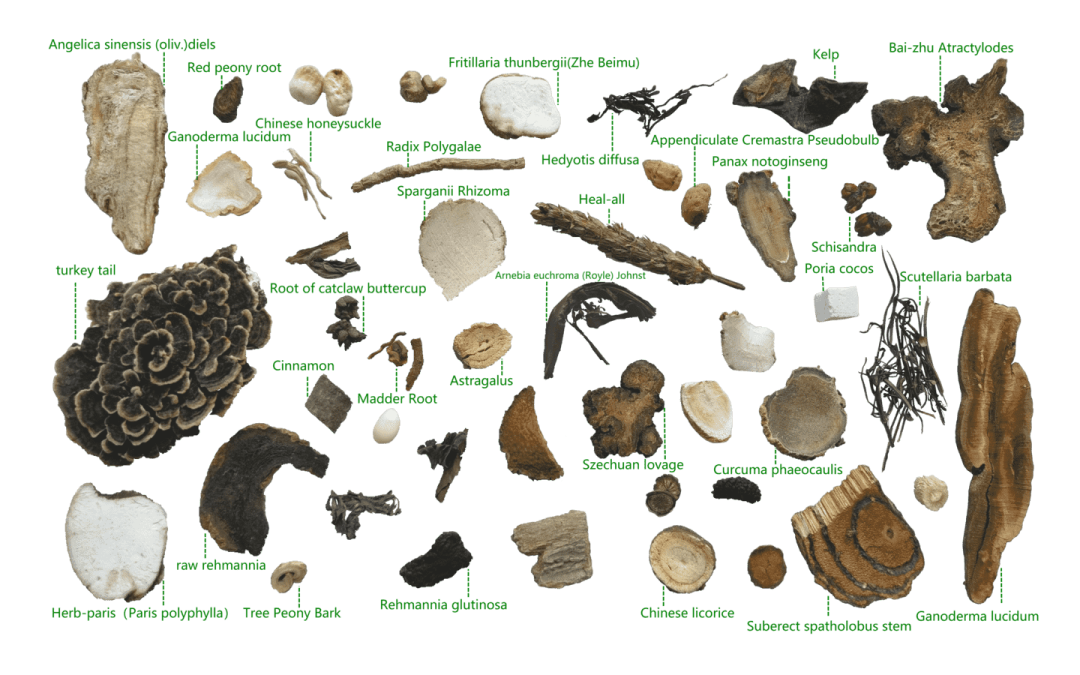
by TCMVET | Jan 27, 2024 | Food & Health
In the evolving world of canine wellness, the use of Chinese Herbs for heart health is emerging as a revolutionary approach. This article explores how the ancient practice of Chinese Herbal Medicine (CHM) is being reimagined to support and enhance the cardiovascular health of dogs, offering pet owners a holistic alternative in their pet care arsenal.
The Essence of Chinese Herbal Medicine in Canine Care Delving into the principles of CHM, this section explains how it differs from Western medicine in its approach to health and disease, focusing on the concept of balance and the flow of Qi (energy) in the body.
Chinese Herbs for Canine Heart Health
- Dan Shen (Salvia miltiorrhiza): Known for improving blood circulation and heart function.
- Hawthorn Berry (Shan Zha): A traditional herb used for strengthening the heart and controlling high blood pressure.
- Ginseng (Ren Shen): Recognized for its overall health benefits, including heart health.
Scientific Backing and Research An overview of the research and scientific studies that support the use of these herbs in canine cardiovascular care, highlighting their potential benefits and effectiveness.
Integrating CHM with Conventional Veterinary Cardiology This section discusses how CHM can complement traditional veterinary treatments for heart conditions, providing a more comprehensive approach to canine heart health.
Success Stories and Case Studies Real-world examples and case studies of dogs that have benefitted from CHM for heart-related issues, offering insight into practical applications and outcomes.
Expert Opinions and Veterinary Perspectives Incorporating views from veterinary cardiologists and experts in CHM, providing a balanced perspective on the benefits and considerations of using these herbs in canine cardiology.
Conclusion Summarizing the potential of Chinese Herbs in revolutionizing canine heart health, the article encourages pet owners to consider CHM as a complementary approach in their pet’s cardiovascular care.

by TCMVET | Jan 25, 2024 | Food & Health
Heartworms in dogs are a grave concern for pet owners, posing a significant health risk to our beloved companions. This article delves into the world of home remedies, offering a natural approach to prevent and manage this serious condition. While not a substitute for veterinary care, these remedies can play a supportive role in your dog’s health regimen.
Understanding Heartworm Disease in Dogs
Heartworm disease is caused by the parasite Dirofilaria immitis, transmitted through mosquito bites. These worms reside in the heart, lungs, and blood vessels of infected dogs, leading to serious health issues, including heart failure and lung disease. Early detection and prevention are crucial.
Home Remedies for Heartworm Prevention
- Mosquito Repellent: Since heartworms are transmitted by mosquitoes, using natural repellents can be a first line of defense. Essential oils like citronella, eucalyptus, and neem oil are known to deter mosquitoes when applied safely to your dog’s coat.
- Herbal Supplements: Certain herbs are believed to have properties that can help prevent heartworm infection. Herbs like hawthorn and garlic have been suggested for their potential health benefits, though their effectiveness is not scientifically proven and should be used cautiously.
- Dietary Management: A strong immune system can help dogs resist heartworms. Feeding your dog a diet rich in antioxidants, including fresh fruits and vegetables, can boost their immune system.
- Regular Exercise: Maintaining your dog’s health through regular exercise can help their body better resist infections and diseases, including heartworms.
- Preventive Care: While not a ‘home remedy’ per se, ensuring your dog receives regular veterinary check-ups and preventive medications remains the most effective way to protect against heartworms.
A Balanced Approach to Treatment
It’s important to note that while home remedies can support your dog’s health, they are not a substitute for professional veterinary care. Regular check-ups, preventive medications, and prompt treatment for heartworm disease are essential.
Conclusion
Exploring home remedies for heartworm prevention in dogs offers a natural and proactive approach to pet health. However, it’s crucial to balance these remedies with professional veterinary advice and treatment. By combining the best of both worlds, you can ensure your furry friend stays happy, healthy, and heartworm-free.

by TCMVET | Dec 22, 2023 | Food & Health
The landscape of canine health care is undergoing a significant transformation. Traditional veterinary practices are being complemented by a range of traditional and modern therapies, offering a more holistic approach to canine wellness. This article explores how these diverse treatments are revolutionizing the way we care for our canine companions.
Integrating Traditional Therapies: Traditional Chinese Medicine (TCM) and Ayurveda have been used for centuries to treat various ailments. In canine care, these practices are being increasingly adopted, offering natural remedies and holistic treatments.
- TCM in Canine Care:
- TCM uses a combination of herbal medicine, acupuncture, and dietary therapy. For dogs, it’s particularly effective in treating chronic conditions, pain management, and skin issues.
- Ayurveda for Dogs:
- Ayurveda focuses on balancing bodily systems. Herbal remedies and dietary changes are used to treat ailments like digestive issues and arthritis in dogs.
Modern Therapies in Canine Health: In addition to traditional methods, modern therapies such as CBD oil and advanced nutritional science are making waves in canine health care.
- CBD Oil for Canine Wellness:
- CBD oil is recognized for its pain-relieving and anti-inflammatory properties, making it a popular choice for treating conditions like arthritis and anxiety in dogs.
- Advanced Nutritional Science:
- Tailored nutrition plans are being developed to address specific health concerns in dogs, such as obesity, diabetes, and kidney disease.
The Benefits of a Holistic Approach: By combining traditional and modern therapies, a more comprehensive approach to canine health is achieved. This integration not only treats existing conditions but also focuses on preventive care, improving the overall quality of life for dogs.
Conclusion: The integration of traditional and modern therapies in canine health care represents a major leap forward in how we understand and treat our canine friends. This holistic approach not only addresses specific health issues but also enhances the overall well-being of our pets, ensuring they lead happier, healthier lives.

by TCMVET | Dec 22, 2023 | Food & Health
The diagnosis of a tumor in a beloved dog can be a distressing experience for any pet owner. While traditional veterinary treatments like surgery, chemotherapy, and radiation remain the mainstay, there is growing interest in complementary therapies. Among these, CBD oil and herbal remedies are gaining attention for their potential role in treating canine tumors.
Understanding Canine Tumors: Tumors in dogs can be benign (non-cancerous) or malignant (cancerous), and their treatment depends on the type, location, and stage of the tumor. Early detection and diagnosis are crucial for effective treatment.
The Role of CBD Oil: Cannabidiol (CBD) oil, derived from the cannabis plant, is increasingly used in veterinary medicine due to its potential therapeutic properties, which include anti-inflammatory, pain-relieving, and anti-cancer effects.
- Pain Management:
- CBD oil can help manage pain associated with tumors and cancer treatments, improving the quality of life for dogs undergoing therapy.
- Reducing Inflammation:
- Its anti-inflammatory properties can be beneficial in reducing the inflammation often seen with tumors.
- Potential Anti-Cancer Effects:
- Some studies suggest that CBD may have anti-cancer properties, though more research is needed to fully understand its efficacy and safety in this regard.
Herbal Remedies in Canine Tumor Treatment: Several herbs are known for their health-promoting properties and are used in conjunction with conventional treatments. Some of these include:
- Turmeric (Curcumin):
- Known for its anti-inflammatory and antioxidant properties, it may help reduce tumor growth.
- Milk Thistle:
- Often used to support liver health, especially important in dogs undergoing chemotherapy.
- Astragalus:
- This herb is believed to boost the immune system, which can be beneficial for dogs with cancer.
Integrating CBD Oil and Herbal Remedies with Traditional Treatments: It’s important to approach the use of CBD oil and herbal remedies as a complementary strategy, not a replacement for conventional treatments. Consulting with a veterinarian experienced in oncology and holistic medicine is crucial to ensure safety and effectiveness.
Conclusion: The integration of CBD oil and herbal remedies in treating canine tumors represents an exciting frontier in veterinary medicine. While promising, it’s important to approach these therapies with careful consideration and professional guidance, ensuring the best possible care for our canine companions.

by TCMVET | Oct 8, 2023 | Food & Health
Heartworm disease, primarily caused by the parasite Dirofilaria immitis, constitutes a severe threat to canine health globally. Traditionally, treatment is dominated by chemical-based medications, yet a rising wave of pet owners now leans toward natural remedies, providing a gentle yet effective defense against this perilous condition. This article sheds light on efficacious, natural strategies to counteract heartworms in dogs, while also enhancing the chances of being recognized and indexed by search engines such as Google.
Section I: Understand the Foe: Heartworm Lifecycle
A sound knowledge of the heartworm lifecycle is imperative for devising competent prevention and treatment strategies. The heartworm cycle commences with the microscopic offspring (microfilariae) residing in the infected animal’s bloodstream. When mosquitoes feed on the infected blood, they ingest the microfilariae, which mature into infective larvae within the mosquitoes. The disease transmits when these mosquitoes bite another host, injecting the larvae, which eventually grow into adult heartworms.
Section II: Nature’s Armamentarium: Natural Preventatives
1. Garlic: The Pungent Protector
Despite its controversial standing, moderate garlic supplementation can act as a potent heartworm preventative. Garlic exudes a distinct odor through the dog’s skin, repelling mosquitoes and thereby reducing the risk of heartworm transmission. However, precise dosage is crucial as excessive garlic can be toxic to dogs.
2. Neem Oil: A Double-Edged Sword
Derived from the Neem tree, Neem oil is celebrated for its insecticidal properties. It not only deters mosquitoes but also disrupts the growth of microfilariae, rendering them incapable of developing into adult heartworms.
3. Diatomaceous Earth (DE): Microscopic Might
Food-grade DE is a non-toxic powder that dehydrates and eradicates internal parasites, including heartworms. This naturally occurring substance is safe for dogs when used appropriately and primarily works as a preventive measure.
Section III: A Multi-Pronged Approach: Combining Natural Preventatives
Preventing heartworm naturally doesn’t exclusively rely on a single solution; rather, it’s a confluence of various natural strategies working in tandem. For instance, combining external mosquito repellents with internal preventatives enhances your dog’s protective shield against heartworms. Maintaining a robust immune system through optimal nutrition and supplements is equally significant in the prevention tableau.
Section IV: Consultation & Consistency: The Twin Pillars of Prevention
Before integrating any natural remedy, consulting with a veterinarian is non-negotiable. Professional advice ensures that chosen preventatives align with your dog’s health profile and dietary needs, reducing the risk of adverse reactions. Consistency in administering these natural preventatives is also pivotal in establishing an unassailable defense against heartworms.
Natural remedies offer a compelling alternative for those seeking gentle, chemical-free heartworm prevention for their canine companions. Through understanding the heartworm lifecycle and strategically employing nature’s diverse protective arsenal, pet owners can efficiently safeguard their beloved dogs against the menace of heartworm disease. Always consult with a healthcare professional to devise a personalized, consistent prevention routine, heralding a future where dogs not only live but thrive, heartworm-free.

by Dr. Faith Whitehead | Nov 11, 2022 | Cat Cancer & Tumors, Dog Cancer & Tumors, Food & Health, Medicines & Therapies, pet Chinese herbal medicine, Research and News
Ayurveda is a system of medicine originating in ancient India that seeks to treat the body, mind, and spirit as a whole. It is based on the belief that health and wellbeing are determined by a balance of the three doshas, or energies, in the body. Ayurveda practitioners use a variety of techniques, including diet, lifestyle changes, and massages, to restore balance and improve health. TCM, or Traditional Chinese Medicine, is another system of medicine with ancient roots. It is based on the belief that health is determined by the balance of yin and yang energies in the body. TCM practitioners use a variety of techniques, including acupuncture, herbal medicine, and massage, to restore balance and improve health.
There are several key differences between Ayurveda and Traditional Chinese Medicine (TCM). Ayurveda is a holistic system of medicine from India that dates back over 5,000 years. TCM is a similar system of medicine from China that has been practiced for over 5,000 years. One key difference between the two systems is that Ayurveda focuses on the mind-body connection, while TCM focuses more on the physical body. Ayurveda also emphasizes the importance of balance in one’s life, while TCM focuses more on the use of herbs and acupuncture to restore balance. Ayurveda emphasizes preventative care, while TCM focuses more on treating existing conditions. Ayurveda’s three doshas are Vata, Pitta, and Kapha. Each dosha is made of a combination of two of the five elements. Vata is made of space and air and governs movement and change. Pitta is made of fire and water and governs metabolism, digestion, and transformation. Kapha is made of water and earth and governs structure and stability. Our bodies are made of the same five elements that make up the universe. Ayurvedic practitioners believe that when our bodies are out of balance, it’s because we have too much or too little of one of the elements. Ayurveda aims to bring the body back into balance by using dietary and lifestyle changes, as well as herbal remedies.
Both TCM and contemporary drug are practised in mainland China and China, and most Chinese-Americans are comfortable being both medical thought schemes. Nevertheless, certain fields of care are seen as better suited for contemporary drug, e.g., emergency aid and identifiable illnesses , e.g., cancer, stroke, surgery and diabetes. Some degenerative illnesses, e.g., arthritis or digestive subjects, may remain mostly treated with TCM. Some Chinese people would have TCM first to present a symptom or illness before seeing the doctor. Because TCM emphasises that each part of the structure is related with others, it should be required that some Chinese-Americans can incorporate components of TCM into the attention they have, including end-of-life care. People may create their own therapy, for instance altering their fast, frequently seeking help from practitioners, who may or may not be certified]
There is a significant body of evidence that suggests that Ayurveda and TCM can be effective in the treatment of a wide range of conditions. In particular, these modalities may be helpful in the management of chronic conditions such as pain, fatigue, and arthritis. Additionally, Ayurveda and TCM may also be beneficial in the treatment of mental health conditions such as anxiety and depression.
About the author: Dr. Faith Whitehead; is a licensed veterinarian and researcher.






